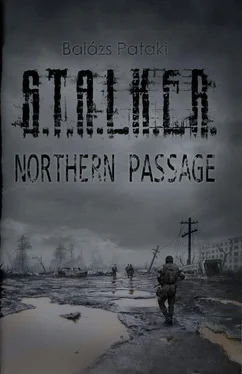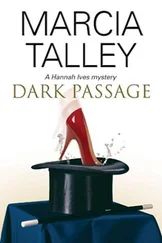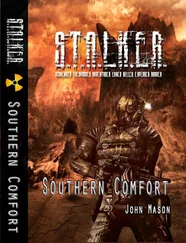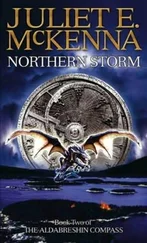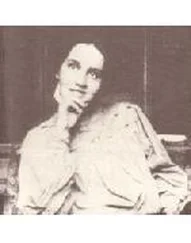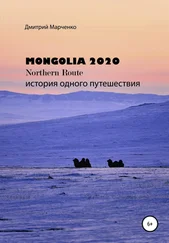“Idi svoyei doro’goi, Stalker!”
“What’s his problem?” Hartman asks.
“He said, ‘get out of here, Stalker’.”
“But we’ve just arrived!”
Tarasov just shrugs and moves on. “You’ll hear it a lot here.”
The nightfall has awaken a myriad of crickets who now fill the Zone with their high-pitched, rhythmic chirp. Through the loudspeaker comes the faint sound of music: a female voice sings a sad and slow song accompanied by a piano.
“I know that song,” Nooria says. “It was playing in Sultan’s telephone.”
“It’s certainly more pleasant than Duty’s propaganda.”
Pete has barely finished his sentence when another announcement comes.
“CHERNOBYL VETERANS! WE HAVE A HUGE RESPONSIBILITY TO PROTECT THE WORLD FROM THE EXPANDING ZONE!”
“Give me a break,” Tarasov grumbles.
Through the warehouse they reach an alley running along yet another industrial building. ARENA — Danger Zone is written on a grey metal gate. To their left, an almost identical building looms in the darkness. A huge sign reads BAR and, probably to make sure that even the dumbest Stalker finds his way to the local inn, another sign over the door of a lower building is painted in flashy green and red Cyrillic letters.
Tarasov leads his companions through a narrow lane between a concrete fence and more brick walls, until they reach a stair leading to the basement of a building that appears like an air-raid shelter. A bright lamp casts its light over the entrance and the promising sound of chatting patrons and glasses ringing in a toast comes from below.
“Welcome to the 100 Rads,” Tarasov says with a smile.
“What’s this?” the Top asks looking at the discolored picture fastened to the concrete wall of the staircase. It shows a soldier closely examining the breech of his rifle with a Russian text below .
“To have accuracy and agility in battle, maintain your rifle, soldier, as you maintain your life,” Tarasov translates. “Sounds much better in Russian: Chtob metkost i snorovku imet v boyu, hrani boets vintovku kak zhizn svoyu. ”
“Outstanding,” nods the former Marine. “I like this place.”
At the bottom of the stairs, behind a counter welded from metal grates, a Stalker is standing, wearing a Mercenary’s outfit consisting of a grayish fatigue with a wood camouflage assault vest worn over it. A black balaclava hides his face but his eyes give them a friendly wink. Seeing the travelers stopping and study the picture, he waves to them.
“Nu chom stoish? Davai, podhodi!” the Dutyer guarding the entrance says.
“Translation please,” Pete says.
“He said, ‘come in, don’t stand there’!” Tarasov replies as he walks down the stairs.
“You can’t go there!”
Pete looks at the second guard blocking the way to a dimly lit corridor who looks exactly like the other one calling them in a minute before. They resemble each other to the extent that for a moment, it occurs to Pete that he might be the same person. The only difference is that this one has noticed that some of them don’t speak English and has addressed them accordingly. It could have been a courtesy if he didn’t sound rude nonetheless.
Pete, however, is not much impressed — as if a bouncer in the middle of the Exclusion Zone greeting him in English would be the most natural thing.
“But you just told me to come in,” he says. “Make up your mind, dude.”
“I said, you can’t go there.”
“Why?” Pete asks.
“Because you can’t go there.”
“You told me that already.”
“And you should have gotten it the first time. I said, you can’t go there!”
“Never mind, Pete,” Tarasov says. “That’s just Barkeep’s quarters.”
Under the arched ceiling, two dozen Stalkers have gathered around a few roughly hewn tables. Their attire varies from the newcomers’ light jackets over jet pilot style protective suits to the heavy combat armor that the few Dutyers among them are wearing. However, not even the tough-looking fighters seem to be in a better mood than most Stalkers—alcohol has apparently taken a toll on the patrons’ spirits and a cloud of melancholy seems to linger over them. The food is certainly not something that could cheer anyone up: the only ingredient visible in the kitchen separated from the rest of the bar by a counter is the neatly skinned head of a boar in a huge pot, stewing over low fire. A ventilator standing on the top of a rusted refrigerator blows the vapors rising from the pot directly towards the customers. It smells surprisingly pleasant, but seeing the source of the aroma would probably make even the hungriest customer think twice about ordering food.
Behind the counter, a balding, stout man walks slowly up and down, keeping his hands in the pockets of the lambskin vest he is wearing. The tucked-up sleeves of his green pullover reveal tattoos on his forearms resembling blue flames. Every movement he makes shows the calmness of someone completely aware of being the boss around here. He occasionally greets a familiar customer with a deep voice, not making an exception with Tarasov either.
“Hey man, how goes it?”
“Nichego. Normalno,” Tarasov casually replies.
Barkeep looks at the travelers with his eyes narrowed. He gives Tarasov a particularly inquisitive look.
“Making it to Rostok was a major feat,” he smirks and gives Tarasov a wink. “Welcome to the 100 Rads, Stalker.”
“Glad to be here,” Tarasov replies, relieved over their host’s apparent willingness not to blow their cover. “A bottle of Cossacks for me and my friends, please.”
“Here you go,” Barkeep says putting a bottle of vodka on the counter. Its blue label has a picture of a bunch of merry-looking Cossack raiders on it.
“Best vodka in Ukraine,” Tarasov proudly says and offers the bottle to his companions. “Cheers!”
An action movie plays on the small TV set on the top shelf, showing someone running along a train and brandishing a handgun. The TV is muted though, and an old-fashioned tape recorder plays a song featuring only two instruments — a bass guitar and a flute. It sounds overly melancholic but seems to fit the mood of the patrons. Enjoying the soothing effect of the spirit in his stomach, Tarasov allows himself for a moment of bliss — the chatter of the half-drunk Stalkers and the slow music evokes memories of days when he was still a player in the Zone, often meeting with old friends here. Although he hears a few sentences in French, German and a Slavic language he guesses to be Croatian, most of the chatter is Russian. Staring at the vodka bottle, he keeps on listening to the chatter and to practice his English, mentally translates the fragments of conversations overheard.
“Pojrat bi chego khoroshego.”
Wish we had something nice to eat.
“Ne uchatsja nichemu nekotorie, I uchitsya ne khotyat, kina amerikanskogo nasmotrelis I krishi poekhali, ti emu pro anomalii, a oni pro khabar, tolko babki ikh interesuet.”
Some don’t learn anything, and they don’t want to study either, they saw enough American movies and went nuts, you talk about anomalies and they tell you only the news, only money is what interests them.
“ Net, ot sudbi tochno ne ubejat i nikuda ne detsja, shto napisano, to i proizojdet. Nichego ne vidno na gorizonte.”
No, you cannot escape fate, what is written will happen. There is nothing on the horizon.
“Novichkov ninche—i vse oni lutshe starikov znayut.”
Those rookies nowadays—they know everything better than the veterans.
“Vot ved kak grustno vse vikhodit.”
Читать дальше
